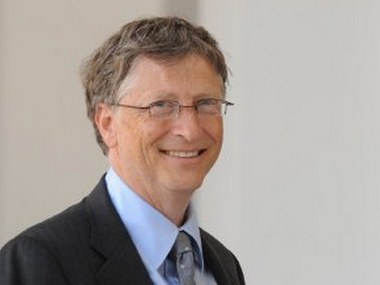At a closed-door meeting of India’s wealthy businessmen with Bill Gates in Bangalore last Friday, an interesting idea was floated: it may be better for the rich to bequeath their fortunes to charity than their offspring.
The event, hosted jointly by Wipro chairman Azim Premji, Tata Group chairman Ratan Tata and Bill Gates of Microsoft, was intended to catalyse charity and public giving by the wealthy, but without any overt pressure to commit any funds.
[caption id=“attachment_330195” align=“alignleft” width=“380” caption=“The global philanthropist. AFP”]  [/caption]
According to The Economic Times, Gates, who is leaving the bulk of his own money to charity, spoke about “how history has shown that leaving behind wealth to serve good causes is better than letting offspring inherit it.”
Government all over have always believed that, and tried to tax inheritances by levying high estate duties or wealth taxes. But this has only pushed more money underground and into dubious trusts. Voluntarism apparently works better in getting the rich to cough up more to the poor.
Bill Gates, along with billionaire investor Warren Buffett, began the process in 2010 when they invited a handful of other billionaires to a confidential dinner in New York to discuss giving at least 50 percent of their wealth for good causes. They set an example by pledging to give more than 90 percent of their own wealth during their lifetimes and after.
ET does not say whether the Bangalore meeting with Gates resulted in billions of rupees in pledges to charity, but the fact that charity is now figuring more prominently in the Indian business lexicon is a welcome development.
In fact, the idea of businessmen holding wealth in trust on behalf of the poor lies at the core of Mahatma Gandhi’s trusteeship concept. Gandhi had less faith in the state’s ability to address poverty than in the innate good nature of rich humans to help their less fortunate brethren. His faith is yet to justified by Indian businessmen making large pledges to charity or public causes, but things seem to be finally moving in that direction now.
Among others, Azim Premji, Shiv Nadar of HCL, and GM Rao of the GMR Group have committed themselves to making huge gifts to charity. Investor Rakesh Jhunjhunwala has also pledged a quarter of his wealth for good causes. Last year, The Economic Times quoted Jhunjhunwala as saying: “I treat charity as my fourth child and will divide my wealth equally among my children.” That’s how the newspaper calculated that he was going to give away a fourth of his wealth for good causes, since he has three children ( read here).
At the Premji meeting in Bangalore, the attendees included Sunil MIttal of Bharti Airtel, Anu Aga of Thermax, GM Rao, Kiran Mazumdar Shaw of Biocon, Analjit Singh of Max India, Anil Agarwal of Vedanta, Krish Gopalakrishnan of Infosys, GVK Reddy of GVK Group, Omkar Kanwar of Apollo Tyres, and MV Subbaiah of the Murugappa group, among others.
If most of them leave the bulk of their fortunes for the poor rather than their sons and daughters, it would indicate that trusteeship could be a third way to make capitalism work - the other two being state capitalism or laissez faire.
Capitalism has seen unparalleled success in generating wealth, but it has also created unparalleled greed and inequity. Gandhi saw no merit in entrusting the state with the job of running businesses; capital, he felt, was better left to capitalists.
While there may be no takers for his brand of austerity in today’s world, giving more to charity should be a second-best alternative at least.
Gandhi did not see the point in individuals accumulating wealth beyond need. Nor does Buffett, the originator of the idea of giving it away along with Gates.
Buffett saw wealth as largely being the result of being born to the right people in the right places. We quoted him in an earlier _Firstpost_ story: “My wealth has come from a combination of living in America, some lucky genes, and compound interest. Both my children and I won what I call the ovarian lottery. (For starters, the odds against my 1930 birth taking place in the US were at least 30 to 1. My being male and white also removed huge obstacles that a majority of Americans then faced.) My luck was accentuated by my living in a market system that sometimes produces distorted results, though overall it serves our country well. I’ve worked in an economy that rewards someone who saves the lives of others on a battlefield with a medal, rewards a great teacher with thank-you notes from parents, but rewards those who can detect the mispricing of securities with sums reaching into the billions. In short, fate’s distribution of long straws is wildly capricious.”
The wealthy Indians who attended the Bangalore bash were mostly in the same category as Buffett, winners of the ovarian lottery but in an Indian setting.


)
)
)
)
)
)
)
)
)



